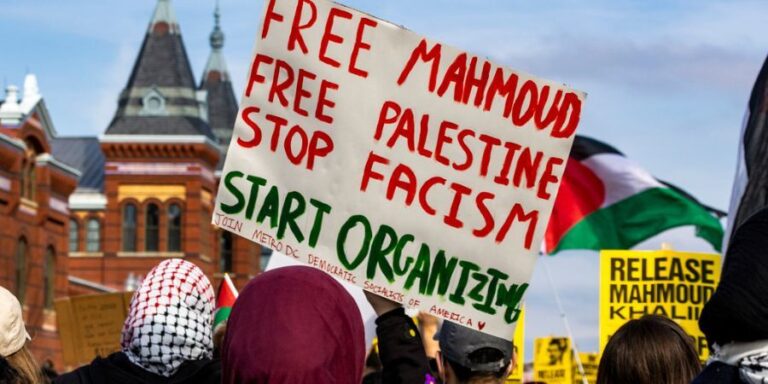by Jer Swigart
In his most recent letter from a detention center, Mahmoud Khalil—a soon-to-be father, a husband, a beloved community leader—continues to embody a courageous hope that should stop every one of us in our tracks. Writing from confinement, he names the painful truth that so many would rather avoid: that democracy is far more fragile than we admit, and that the rights we declare to be inalienable are, in reality, deeply conditional.
His letter is not just a reflection of personal pain—it’s a prophetic witness from the underside of power. And if we’re paying attention, it’s also an invitation. For people of faith, particularly those shaped by the Jesus tradition, it’s an urgent call to move beyond paralysis or indifference and into creative, costly love.
We cannot keep telling resurrection stories in our sanctuaries if we’re unwilling to practice resurrection in the streets.
The myth of democracy suggests that all people have equal protection under the law, equal access to due process, and equal opportunity to thrive. But Mahmoud’s story—alongside the stories of so many others in detention centers, prison cells, and refugee camps—exposes the gaping holes in that myth. And yet, in the face of unimaginable injustice, Mahmoud continues to write with compassion, not contempt. Hope, not hatred.
This is what the teaching of Jesus forms in us when we let it: a way of being that is hard on systems and soft on people. Jesus constantly exposed and disrupted oppressive structures—religious, political, economic—while simultaneously humanizing those who were caught within them. He stood between the stones and the woman. He wept over Jerusalem while speaking defiant truth to its powerbrokers. He forgave as he was being executed.
So what does this mean for us?
If we’re proximate to power, it is not enough to simply “raise awareness” or “speak out.” We must forge relationships of costly solidarity with those in our own communities, like Mahmoud, who are being silenced and sidelined. We must move closer to pain, not further from it. And in the same breath, we must deepen our relationships of accountability with those who hold institutional power—challenging them not with shame, but with the clear-eyed conviction that Jesus embodied.
This is what peacemaking looks like in practice.
In our neighborhoods.
In our churches.
In city council chambers and community board meetings.
In detention centers and living rooms.
My friend, now is not the time for comfortable optimism or hand-wringing despair. Now is the time for action—grounded in compassion, fueled by imagination, and guided by the example of Jesus, who loved relentlessly, confronted boldly, and restored tenderly.
Mahmoud’s letter is a mirror. The question is: Will we look into it long enough to be changed?
Photo courtesy Diane Krauthamer

